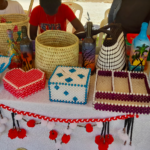The Agriculture sector has for many decades been the backbone of Kenya’s economy with the sector directly contributing more than 22 per cent of the country’s Gross Domestic Product (GDP).
This is according to a survey conducted by the Central Bank of Kenya (CBK) Monetary Policy Committee on Agriculture in 2022. It employs more than 40 percent of the total population and 70 percent of the rural population.
According to the report, 15 to 17 percent of Kenya’s total land area has sufficient fertility and rainfall to be farmed and seven to eight percent can be classified as first-class land. But this land mass has been dwindling due to various reasons such as climate change, high cost of farm inputs such as certified seeds and fertilizer.
For instance, a World Bank report on the state of agriculture in Kenya released in December last year indicates that the agriculture sector constricted by 1.5 per cent in the first half of 2022 and this poor performance slowed GDP growth by 0.3 per cent.
Indeed, this important sector has over a period of time experienced a decline in agricultural productivity as a result of erratic rainfall and intensifying droughts.
According to the Kenya Food Security Steering Group (KFSSG) report, the maize harvest for instance in the marginal agricultural areas is only 45 to 50 per cent of the five-year national maize production average.
These are perhaps some of the reasons why in October 2022, the Kenya Kwanza Government lifted the decade-long ban on the cultivation and importation of Genetically Modified food products or Organisms (GMOs).
Lifting the ban means that Kenyan farmers can now openly cultivate GM crops, as well as import food and animal feeds produced through genetic modification, such as white maize which is Kenya’s staple food and is grown in most of all Kenyan farms.
Those opposed to the lifting of the ban on GMO products allege that they pose a health risk to Kenyans, particularly the poor and those with low incomes and might lead to the loss of all indigenous variety of seeds which are equally important and of great nutritional value in the country mainly because of cross-pollination.
They also allege that the government lifted the ban without involving Kenyans through public participation as required by the Constitution.
Kenya banned GMO crops in 2012. The ministerial statement on the ban at the time was largely informed by a 2012 a scientific report dubbed the Seralini study that associated GMOs with cancer in rats.
Currently, there are those advocating for preservation of indigenous seed in the face of the looming introduction of GMO seed in the country. They say this indigenous seed preservation will help enhance food security and nutrition in the country.
The proponents for this ideology argue that adverse effects of climate change coupled with abandonment of indigenous crops has been the greatest contributing factor to the rising scare of food insecurity in the country.
Seed saving and distribution is an ancient practice that has safeguarded farming communities from hunger and malnutrition over the years and has been regarded as a measure to secure farmers from losing their yield as a result of drought or due to other factors affecting agriculture.
It is for this reason that Seed Savers Network (SSN), a Non – Governmental Organisation (NGO) has taken it upon themselves to train and equip farmers with skills and resources to mitigate the effects of climate change and address the issue of food security in the country through preservation of indigenous seeds.
Some of the seeds they preserve include; maize seeds, sweet potato seeds, beans and other legumes and traditional vegetables among others.
The program officer at the NGO, Ms Mary Wambui says they are working with over 60,000 farmers across the country in a bid to foster a culture of seed saving in order to ensure a continued steady supply of indigenous seeds that are not available in agro-shops.
“One of the ways SSN is bridging the gap is through organising seed fairs where farmers are provided with a platform to meet and exchange a variety of indigenous seeds with the aim of increasing the seed bank deposits,” Wambui notes.
She however explains that one of the major challenges encountered by farmers and their seed banks is the existence of the Seed and Plant Varieties Act (2012), which prohibits anyone from sharing, exchanging or selling uncertified and unregistered seeds in the country.
Wambui says that it is critical to initiate policy change in order to accommodate the farmer managed seed system as it is important in the whole food value chain and in ensuring preservation of indigenous seeds.
The program officer says that her organisation has been focussing on training farmers with best farming practices in the past 10 years to foster the creation of a farmers’ network grounded on principles of solidarity and trust where for instance highly trained and engaged farmers from different villages in Nakuru County have become Seed Ambassadors.
“Seed ambassadors are farmer leaders who have been trained on mustard seed saving and other agro-ecological practices and have shown an interest in disseminating such information an d practices using the farmer-to-farmer extension (FFE) model,” Wambui says.
One such seed ambassador is Mr James Kariba who hails from Gilgil in Nakuru County who explains that Seed Savers Network (SSN) has been instrumental in helping farmers through the knowledge and skills gained from various training and extension services.
Kariba says they have learnt to practice organic farming hence abandoning the use of chemicals that has enabled them produce healthy foods fit for human consumption and the re-introduction of indigenous crops that are considered to be of high nutrition levels.
According to Kariba, the training has also enabled them to develop their own seed banks in their home to preserve seeds some of which were on the verge of extinction, adding that this has tremendously boosted their food security as well as acted as a source of income through the sale of surplus produce.
Another farmer, Beatrice Wangui from Langalanga area in Gilgil who is also a beneficiary of the program says the training has helped them to practice climate smart agriculture, adding that before the program, farmers heavily relied on the unpredictable rainfall patterns which exposed them to low yields and hunger when it failed.
However, they were trained on alternative means of farming including use of irrigation and this has greatly increased their yields and making them food secure.
Despite the biting drought in the country that has transcended four seasons in some areas causing massive loss of livestock and starvation and malnutrition among the affected population, Wangui says the knowledge gained from the trainings has helped them devise ways of preserving their produce through using traditional ways of drying for use during the dry season.
Some of the common foods they dry and preserve she says include green leafy vegetables, carrots and beetroot among others. Apart from food preservation, the farmers are trained on how to make their own organic fertilizer from mixing dry leaves, charcoal dust, top soil and farm manure to create foliar diverting from the use of chemicals in crops to control pests and diseases.
She says this has helped them produce foods that have lesser chemicals which have been known to contribute to lifestyle diseases that spring from the long-term consumption of chemically grown farm produce.





